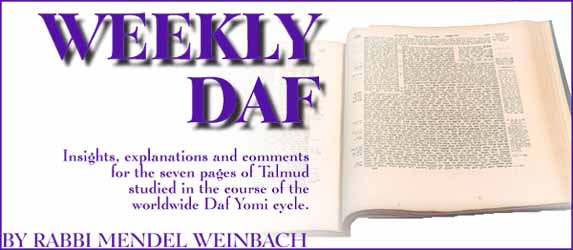Weekly Daf #166

Temurah 2-8 - Issue #166
7-13 Nissan 5757 / 14-20 April 1997
7-13 Nissan 5757 / 14-20 April 1997
| This issue is sponsored by | |
|
Dr. Daniel Farb Los Angeles, California Specializing in the treatment of eye diseases of the elderly |
Avi Dobuler Personal Licensed Tour Guide Groups - Families - Bar/Bat Mitzvahs - Senior Citizens Tour in Modern Mini-Van or Buses Tel: 972-2-997-5425 Cellular: 972-50-379073 Fax: 972-2-997-5421 |
This publication is also available in the following formats:
![]()
![]()
![]() Explanation of these symbols
Explanation of these symbols
Counterproductive Exchange
If someone has consecrated an animal to serve as a sacrifice, he is forbidden to exchange it for another to be offered on the altar in its place, even if the second animal is superior to the first. Should he attempt to make such an exchange by declaring that another animal of his will take the place of the consecrated animal, both animals are considered as consecrated and he is flogged for making the attempt.Rambam explains that the Torah nullified any effort to exchange a sacrifice because Hashem suspected the man who consecrated an animal as a sacrifice of a desire to save money by exchanging it for an inferior one. A blanket ban was therefore imposed on any sort of exchange in order to prevent him from exchanging for an inferior animal, while rationalizing that it is really superior. In order to further discourage him, the Torah not only decreed that his effort to remove the sacred status of the first animal be regarded as an exercise in futility, but also penalized him by decreeing that both animals are considered sacred.
The Sefer Hachinuch sees in this law another example of Hashem inculcating in us the proper respect for the Sanctuary and anything connected with it. The sanctity which the consecrated animal has acquired is inviolable, and any attempt to tamper with its status will be counterproductive, because its sanctity will spread to the animal which was intended to serve as a replacement.
A Bird in the Hand
The Sage Mar Zutra was offered some meat to eat while visiting the yeshiva of Rabbi Ashi. When his hosts informed him that this was particularly nourishing meat because it came form a bechor (first born male animal), he asked them from where they acquired it. They explained that a kohen had sold them a bechor which had a blemish and could therefore be eaten by anyone.Mar Zutra, however, raised the problem of purchasing a bechor from a kohen, because the kohen appears to be conducting business rather than receiving the bechor as a gift as commanded by the Torah. Just as it was improper for a kohen to help out grain owners in their granaries with their threshing and binding in order to encourage them to direct their tithes to him, it was improper for a kohen to give away a blemished bechor to encourage the owner to give him his future first born animals. In both cases it is considered disgraceful for the kohen to do something which had the appearance of him receiving something as payment for services due to him as a gift. Mar Zutra was therefore concerned that even when the kohen sold the bechor to Rabbi Ashi's household there was a suspicion that he sold it at a bargain price in order to promote himself as a recipient for future first born animals.
His hosts reassured him, however, that they had paid the full price for the bechor they served him. There was no reason to fear that the kohen might have actually sold at a reduced price as an investment in the future, because human nature is to get what you can now and not to gamble on the future - "a small gourd in the hand today is better than the possibility of a big gourd tomorrow."
General Editor: Rabbi Moshe Newman
Production Design: Lev Seltzer
HTML Design: Michael Treblow
HTML Assistant: Simon Shamoun
© 1997 Ohr Somayach International - All rights reserved. This publication may be distributed to another person intact without prior permission. We also encourage you to include this material in other publications, such as synagogue newsletters. However, we ask that you contact us beforehand for permission, and then send us a sample issue.
This publication is available via E-Mail
Ohr Somayach Institutions is an international network of Yeshivot and outreach centers, with branches in North America, Europe, South Africa and South America. The Central Campus in Jerusalem provides a full range of educational services for over 685 full-time students.
The Jewish Learning Exchange (JLE) of Ohr Somayach offers summer and winter programs in Israel that attract hundreds of university students from around the world for 3 to 8 weeks of study and touring.
Ohr Somayach's Web site is hosted by TeamGenesis
Dedication opportunities are available for Weekly Daf. Please contact us for details.






